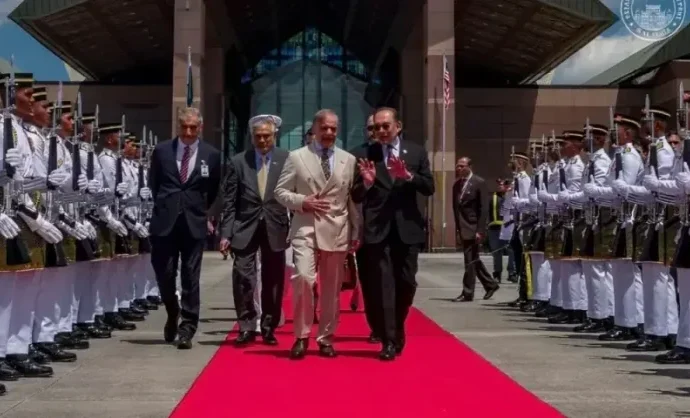Islamabad Staff Reporter
Following Prime Minister Muhammad Shehbaz Sharif’s three-day official visit to Malaysia from October 5 to 7, a joint statement has been issued highlighting the shared commitment of Pakistan and Malaysia to further strengthen their strategic partnership across multiple sectors.
Invited by Malaysian Prime Minister Anwar Ibrahim, this was PM Shehbaz Sharif’s first official visit to Malaysia since assuming office on March 4, 2024. The visit underscored the deep-rooted diplomatic ties between the two nations, established in 1957 and elevated to a Strategic Partnership on March 22, 2019.
During bilateral talks held in a warm and cordial atmosphere, both leaders reaffirmed their shared desire for a dynamic and resilient partnership. They stressed the importance of maintaining high-level exchanges and agreed to reconvene the Joint Commission at the Foreign Ministers’ level at a mutually convenient time.
The two sides expressed satisfaction over ongoing efforts to enhance bilateral trade and investment. They pledged to promote balanced and sustainable economic ties through improved market access, trade facilitation, and effective utilization of the Malaysia-Pakistan Closer Economic Partnership Agreement (MPCEPA).
Malaysia expressed its intent to increase palm oil exports to Pakistan, considering the growing demand in Pakistan’s food processing and manufacturing sectors. Both leaders agreed on ensuring a stable and sustainable supply chain with environmentally responsible practices.
Recognizing the rising global demand for halal products and services, both countries agreed to strengthen cooperation in the halal sector, including mutual recognition of halal certification and improving halal food supply and manufacturing.
The leaders also agreed to explore joint research and innovation in sustainable agricultural practices. They welcomed the progress in defense cooperation under the Joint Committee on Defense Cooperation (JCDC), established in 1997, and agreed to expand collaboration in defense science, technology, and industrial sectors.
Further cooperation was welcomed in education, especially vocational and technical training, and in enhancing institutional partnerships. Recognizing the importance of aviation connectivity, both leaders agreed to improve air travel services and expand air traffic rights to facilitate business, tourism, and economic ties.
In the health sector, both sides agreed to explore cooperation in pharmaceuticals, healthcare, and medical devices to enhance public health and trade. They also reaffirmed their commitment to promote tourism and cultural exchanges.
Acknowledging the contributions of the Pakistani diaspora in Malaysia, both leaders committed to strengthening cooperation in labor, skill development, and technical training.
On energy and climate, both sides agreed to explore collaboration in renewable energy, energy transition, and climate resilience through knowledge sharing, joint research, and investments in clean energy.
The leaders emphasized enhanced collaboration in science, technology, and innovation, particularly in artificial intelligence and digital transformation. They stressed the importance of regional cooperation in disaster risk management and committed to sharing best practices in emergency response and recovery.
On cybersecurity and emerging threats, both sides agreed to deepen cooperation and reaffirmed joint efforts to combat organized crime, terrorism, terror financing, and cybercrime. They also committed to continued exchange of information and expertise to address evolving security challenges.
The two nations reaffirmed mutual support in international forums such as the United Nations, OIC, and D-8, and reiterated their shared commitment to upholding Islamic values and unity among Muslim nations. They agreed that global challenges must be resolved through peaceful means in accordance with international law and relevant UN resolutions.
On geopolitical issues, the leaders discussed ongoing conflicts in the Middle East and the humanitarian crisis in Myanmar affecting the Rohingya Muslim community. They strongly condemned the ongoing genocide in Gaza and reaffirmed their unwavering support for the establishment of a viable, sovereign, and contiguous Palestinian state based on pre-1967 borders with Al-Quds Al-Sharif as its capital. They called for an immediate and unconditional ceasefire in Gaza, lifting of the blockade, protection of all civilians, and unimpeded humanitarian assistance.
Both leaders emphasized the importance of peaceful solutions to regional conflicts in accordance with the UN Charter and international law. They reiterated their support for a peaceful and stable Afghanistan and emphasized ongoing engagement with Afghan authorities to prevent terrorism and provide humanitarian assistance.
The joint statement condemned all forms of Islamophobia, xenophobia, and incitement to violence, emphasizing the promotion of mutual respect and understanding among religions and cultures. Both countries welcomed UN General Assembly resolutions 76/254 and 78/264 on combating Islamophobia and supported efforts to develop an action-oriented plan in consultation with member states.
They also welcomed the appointment of Miguel Ángel Moratinos Cuyaubé from Spain as the UN Special Envoy to Combat Islamophobia.
Prime Minister Shehbaz Sharif reiterated Pakistan’s full support for Malaysia’s ASEAN chairmanship and welcomed progress in the ASEAN-Pakistan Sectoral Dialogue Partnership. He also thanked Prime Minister Anwar Ibrahim and the Malaysian government for their warm hospitality and gracious welcome during the visit.


